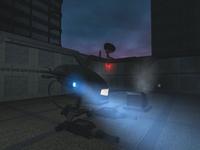| |
Site Navigation
Main
News
Forums
Games
Games Database
Top 100
Release List
Support Files
Features
Reviews
Previews
Interviews
Editorials
Diaries
Misc
Download
Gallery
Music
Screenshots
Videos
Miscellaneous
Staff Members
Privacy Statement
|
|
RPG Codex has the second part of an excellent interview with KaiRo from Piranha Bytes on Gothic 3. Here's a sample:5. The skills have been replaced with "huge amount" of mini-talents that we can use to form our own talents, whatever that means. How does that work? Can you give us some examples? Also, why mini-talents instead of more traditional skills? What's the advantage?
As gets obvious in the answers above, freedom of action is one of the key-features in all the Gothic games. Yet, concerning the skills, the only freedom the game player had so far was to pick a handful of them and make their numerical value rise to 100% (or higher). The freedom in Gothic 3 goes far beyond that point. In order to achieve a greater diversity, we have introduced the mini-talents, so-called perks. Instead of watching a number rise with each invested learning point, the player can actually decide upon what exactly he wants to learn. One-handed sword fighting is the basic perk he needs to be able to carry a sword without killing himself by mistake. This talent can then be upgraded with perks like quick attack, extra-damage against Orcs, power attack, two swords at once, pierce attack, agile movement, etc.! The chosen combination of perks forms the individual fighting style. As you can see, it all boils down to the term freedom. Funny enough, freedom is not a pervasive element in the game's postwar story. The first part can be found here and RPG Codex often moves their content, so check here if the full article moves. |
|
|





 Gothic 3: Interview Pt. 2 @ RPG Codex
Gothic 3: Interview Pt. 2 @ RPG Codex